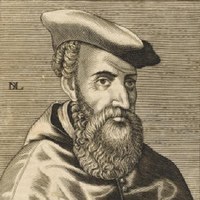Alessandro Piccolomini

Alessandro Piccolomini was born in Siena on 13 June 1508. Since 1524, the year of his father's death, Piccolomini has been entrusted to two tutors who allow him to continue his education. He joined the Accademia degli Intronati around 1528. His first public appearance among the Intronati is traced in 1531, when with the nickname of Stordito, he participates in the representation of Gl'Ingannati with the Sacrificio d'amore which marks the beginning of his academic career. From the Balìa di Siena a comedy is commissioned on the occasion of the descent of Charles V in Siena, L'Amor constant. He writes famous works such as the dialogue La Raffaella and Orazione in praise of women, writings published already after the transfer to Padua in the Accademia degli inflammati. In 1540 L'Institutione was published, revisited and published in 1960. He translates classic works such as the sixth book of the Aeneid, the Metamorphoses and the Economics of Xenophon. He dedicates himself to scientific popularizations by publishing, among his various works, De le stelle fisse, De la sphere of the world, De iride and devotes himself to the works of Aristotle, Mechanics, Rhetoric and Poetics. He maintains correspondence with Varchi, Speroni, Forteguerri. The poet Piccolomini composes many sonnets which are collected in One Hundred Sonnets, printed in '49. In 1554 he published the First and Second Part of Natural Philosophy. Further works will be published in the course of his life until his return to Siena where in 1575 he received the papal bulls for the formalization of the office of archbishop of Patras. He assumes the burden of engaging in the drafting of a last writing, De nova ecclesiastici calendarii. He died on March 12, 1579.

 +34 954 610 124
+34 954 610 124






